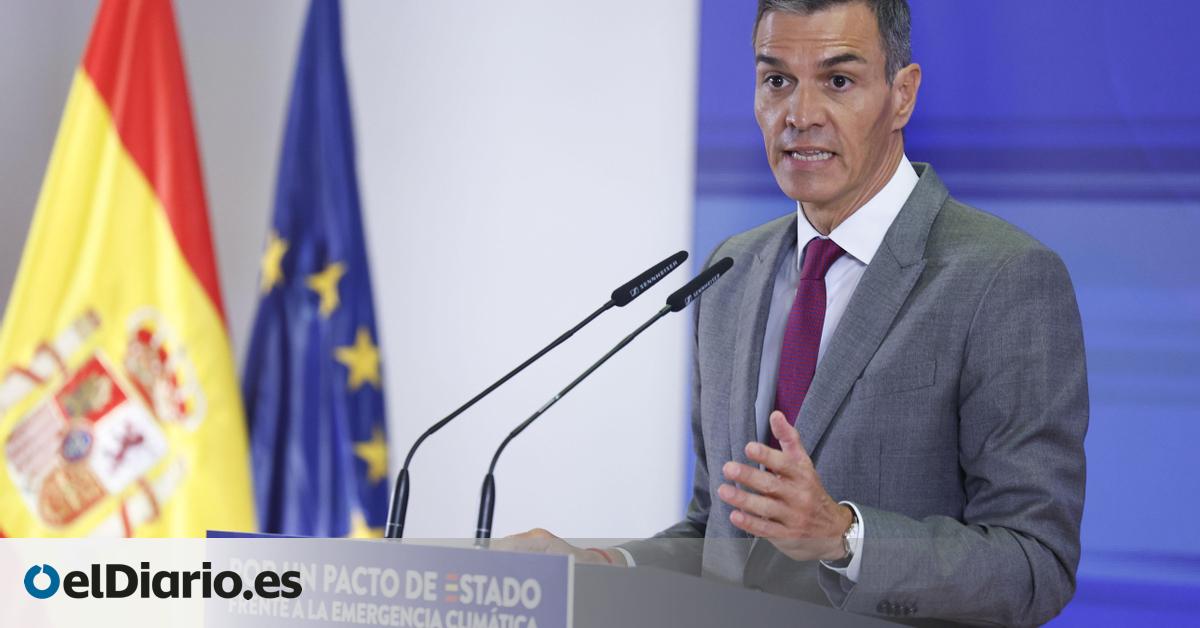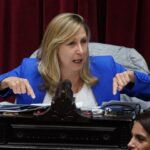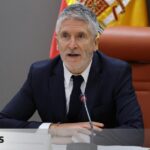
The president of the Government, Pedro Sánchez, has defended on Monday his proposal for the State Pact against Climate Change with ten proposals in an act in which he has criticized the Autonomous Communities for an insufficient preventive work and for not having the necessary means against fire. But the leader of the PP, Alberto Núñez Feijóo, has responded in a few minutes that he does not plan to support that proposal. The opposition head has justified that a similar proposal was already made by Sánchez in 2022 or that the president created a third vice presidency on ecological transition, which is now in front of Minister Sara Aagesen. In his opinion, Sánchez “has no credibility” on any kind of agreement.
Among the ten lines proposed by the government “to the whole of society,” said Sánchez, highlights the creation of a State Civil Protection Agency “that enhances the proper functioning of the system” and the maintenance “365 days of the year”, by all administrations, of “all means to prevent and combat climatic events,” he defended, in reference to the shortage of means in certain communities. “[Es necesario] Have stable, formed and endowed firefighters and brigades. Bet on public policies. It is useless to save a euro in prevention if you have to spend a hundred in response and a thousand on repair, ”said the president.
Among the rest of the measures to explore – the Council of Ministers will approve this roadmap on Tuesday – are also to strengthen coordination, develop an advanced forest management model, carry out a national strategy of “water resilience”, create a “wide network of climatic shelters” by the entire state, enhance the role of the rural world as a defender of natural heritage or promote practices of more sustainable agriculture and livestock extensive livestock.
The president has tried to defend the need to act in the face of “much more virulent, unpredictable, lethal” fires, before “a climatic emergency whose impact is undeniable”, a statement that he has held with figures: “From 70 days of summer, one third we have passed in heat waves,” he shot. “There have been points of the geography converted into furnaces, with 59 temperature records, maximum of up to 46 degrees and average of 2.5º higher than those of the beginning of the century. In the last five years the heat deaths in Spain have grown by 17% and the droughts have extended until 40% of the territory have been extended,” he has listed.
With this panorama, he explained, the Executive at this time has three priorities: “to extinguish active fires, transfer financial aid and extraordinary resources approved by the Council of Ministers and do whatever it is needed so that this tragedy does not repeat itself in the dimension that has been recorded in many municipalities of the country.”
Sanchez also recalled that the situation is not exclusive to Spain, and that the collaboration of countries such as Portugal, France or others of the Mediterranean basin will be necessary to obtain results.
Three Fire Factors
Sanchez explained that three factors have fed those that he has described as the worst fires of the century, with 130 fires only this summer that have forced to deploy all possible means of the State.
The first element that has enabled the lived “tragedy” has been “a clearly insufficient fire prevention policy. It is reflected in the lack of plans executed, in the absence of prevention analysis instruments, in the absence of forest brigades templates, which in some territories was not sufficiently equipped,” the president has started, without wanting to point to any community in particular.
The second element is “the management of the territory, also inadequate,” said Sánchez: “Biomass mountains, with lack of infrastructure, obsolete anti -capital infrastructure” or forests without native species have fed the fire, the president said.
Finally, Sánchez has affected, “it has been a climatic emergency that has made the much more virulent, unpredictable, lethal fires. A climatic emergency whose impact is undeniable,” he said in allusion to Vox’s denialism or the alleged incendiary frames that the PP leader has defended, Alberto Núñez Feijoó.
The government’s proposal comes just when the main fires of the one that has ended up being, with statistics in hand, the worst summer of the 21st century, with more than 330,000 hectares calcined, especially in the northwest of the country, have been extinguished or controlled. It is not just a matter of extension. Forest technicians and political positions have indicated in recent weeks the change that fires are suffering, increasingly violent and, sometimes, inextinguishable.
The government’s proposal does not seem to have awakened too much enthusiasm, even among its legislature partners, and already has the frontal rejection of the PP from the first minute. His spokesman in Congress, Ester Muñoz, described the measure as “smoke curtain” and “fled forward” on the same day the president proposed. The popular ones, who had been maintaining a low profile with fire management, changed tactics on August 15 in what a PNV deputy described as “concerted strategy” to load against the Executive.
That day, several communities made media requests that the Director General of Civil Protection, Virgina Barcones, crossed out of “impossible”, and the conservative party began to criticize the government hard. Since then the reproaches between the Feijóo party, which accused Civil Protection of not sending media and paved its director of “Pyrocaum.” The government in full replied recalling that the communities where the PP sends have spared in fire media in recent years.
But the Executive wants to give relevance to the pact and show the loneliness of the PP in its refusal to reach a basic agreement, as shown in the list of ministers who have wrapped the president in the act. The First Vice President and Minister of Finance, María Jesús Montero; the Second Vice President and Minister of Labor and Social Economy, Yolanda Díaz; the Minister of Education, Professional Training and Sports and Government spokesman, Pilar Alegría; the Minister of Industry and Tourism, Jordi Hereu; the Minister of Transportation, Óscar Puente; the Minister of Housing and Urban Agenda, Isabel Rodríguez; the Minister of Agriculture, Fisheries and Food, Luis Planas; the Minister of Culture, Ernest Urtasun; the Minister of Economy, Commerce and Company, Carlos Corpora; the Minister of Science, Innovation and Universities, Diana Morant; The Minister of Equality, Ana Redondo, and the Minister of Inclusion, Social Security and Migrations, Elma Saiz.
The Minister of Ecological Transition, Sara Aagesen, has described a scenario of “climatic emergency” for Spain, that if nothing changes, he said, he will go from having a Mediterranean climate to a Estepario for 2050, as science warns. “We are overcoming historical values,” he warned, and has justified the need for information based on information: “Climate change especially affects Spain. Because of its geographical situation, in the Mediterranean basin, 20% faster than the global average is heated. The 2022, 2023 and 2024 years are the most warm from which we have records. June 2025 recorded a record value of thermal anomaly, With more than 3.6º compared to the average.
From this panorama, the minister has stressed that Spain needs to “react in a coordinated and united way” and that “denialism and either laziness” cannot be allowed, in what has sounded to allusion to the PP and Vox. “We need a broad agreement that brings together knowledge, science, effort, talent and will under a common framework. A country response on a broad political and social consensus that allows us to resize and adapt public policies at all levels of administration,” he said.
The Minister of Agriculture, Luis Planas, has made a wink to the countryside and has argued that “the fight against climate change will only be possible by the hand of farmers, farmers and silvicular growers” and that these measures do not go against the field, has rejected a usual criticism of the right, but to guarantee their future, and that of these will be that of all. “Livestock and agriculture are essential for peoples and to protect the territory. Protecting them is to protect everyone’s future,” he said.
Source: www.eldiario.es

